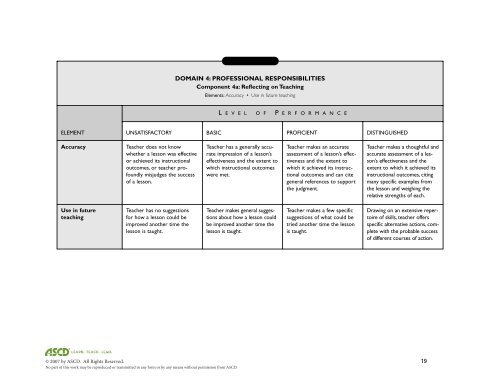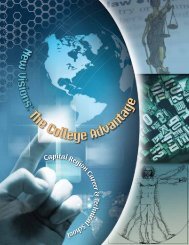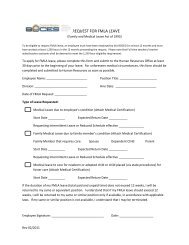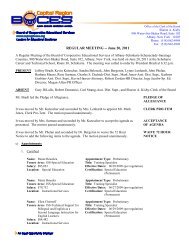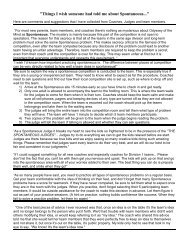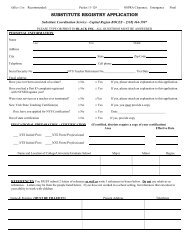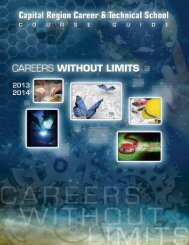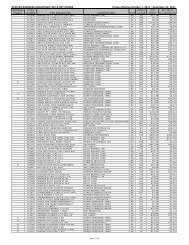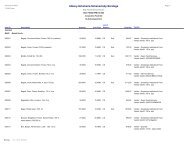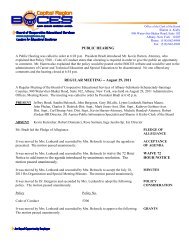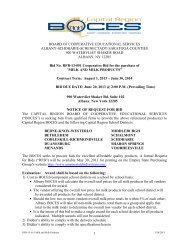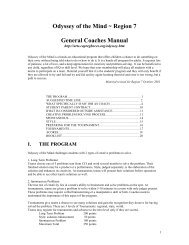Rubrics for Professional Practice - the State Board of Education
Rubrics for Professional Practice - the State Board of Education
Rubrics for Professional Practice - the State Board of Education
Create successful ePaper yourself
Turn your PDF publications into a flip-book with our unique Google optimized e-Paper software.
94 ENHANCING PROFESSIONAL PRACTICE: A FRAMEWORK FOR TEACHING<br />
DOMAIN 4: PROFESSIONAL RESPONSIBILITIES<br />
Component 4a: Reflecting on Teaching<br />
Elements: Accuracy • Use in future teaching<br />
L E V E L O F P E R F O R M A N C E<br />
ELEMENT<br />
UNSATISFACTORY BASIC PROFICIENT DISTINGUISHED<br />
Accuracy<br />
Teacher does not know<br />
whe<strong>the</strong>r a lesson was effective<br />
or achieved its instructional<br />
outcomes, or teacher pr<strong>of</strong>oundly<br />
misjudges <strong>the</strong> success<br />
<strong>of</strong> a lesson.<br />
Teacher has a generally accurate<br />
impression <strong>of</strong> a lesson’s<br />
effectiveness and <strong>the</strong> extent to<br />
which instructional outcomes<br />
were met.<br />
Teacher makes an accurate<br />
assessment <strong>of</strong> a lesson’s effectiveness<br />
and <strong>the</strong> extent to<br />
which it achieved its instructional<br />
outcomes and can cite<br />
general references to support<br />
<strong>the</strong> judgment.<br />
Teacher makes a thoughtful and<br />
accurate assessment <strong>of</strong> a lesson’s<br />
effectiveness and <strong>the</strong><br />
extent to which it achieved its<br />
instructional outcomes, citing<br />
many specific examples from<br />
<strong>the</strong> lesson and weighing <strong>the</strong><br />
relative strengths <strong>of</strong> each.<br />
Use in future<br />
teaching<br />
Teacher has no suggestions<br />
<strong>for</strong> how a lesson could be<br />
improved ano<strong>the</strong>r time <strong>the</strong><br />
lesson is taught.<br />
Teacher makes general suggestions<br />
about how a lesson could<br />
be improved ano<strong>the</strong>r time <strong>the</strong><br />
lesson is taught.<br />
Teacher makes a few specific<br />
suggestions <strong>of</strong> what could be<br />
tried ano<strong>the</strong>r time <strong>the</strong> lesson<br />
is taught.<br />
Drawing on an extensive repertoire<br />
<strong>of</strong> skills, teacher <strong>of</strong>fers<br />
specific alternative actions, complete<br />
with <strong>the</strong> probable success<br />
<strong>of</strong> different courses <strong>of</strong> action.<br />
COMPONENT 4B: MAINTAINING ACCURATE RECORDS<br />
Rationale and Explanation<br />
One consequence <strong>of</strong> <strong>the</strong> complexity <strong>of</strong> teaching is <strong>the</strong><br />
need <strong>for</strong> teachers to keep accurate records <strong>of</strong> routine classroom<br />
events, <strong>of</strong> student progress, <strong>of</strong> noninstructional matters.<br />
In fact, many teachers bemoan all <strong>the</strong> “paperwork” that is an<br />
integral part <strong>of</strong> <strong>the</strong>ir job. However, it is clearly essential;<br />
although not an inherent part <strong>of</strong> interaction with students, such<br />
records in<strong>for</strong>m those interactions and enable teachers to<br />
respond to individual needs. A mark <strong>of</strong> truly experienced and<br />
expert teachers is that <strong>the</strong>y have made <strong>the</strong>ir record keeping a<br />
routine procedure that no longer requires much extra ef<strong>for</strong>t.<br />
When teachers make assignments, particularly those with<br />
© 2007 by ASCD. All Rights Reserved. 19<br />
No part <strong>of</strong> this work may be reproduced or transmitted in any <strong>for</strong>m or by any means without permission from ASCD.


